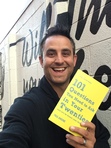Paul Angone's Blog, page 2
April 8, 2020
The Crazy Truth About Transitions and Change
“Transitions are not simply a bridge to the next important season of your life. Transitions are the most important seasons of your life.” – Paul Angone, 101 Questions You Need to Ask in Your Twenties
We’re all dealing with a lot of change and transition right now.
That is an understatement.
As COVID-19 changes the entire world, we’re all trying to figure out the new reality of all our new realities.
Transition is always tough. Change is rarely something that we control or bring on willingly, especially right now.
Transitions can feel like a punch in the gut when you’re looking the other way. For many of us feeling the very real and gut-wrenching affects of the coronavirus, it can feel much worse than that.
What do we do now?
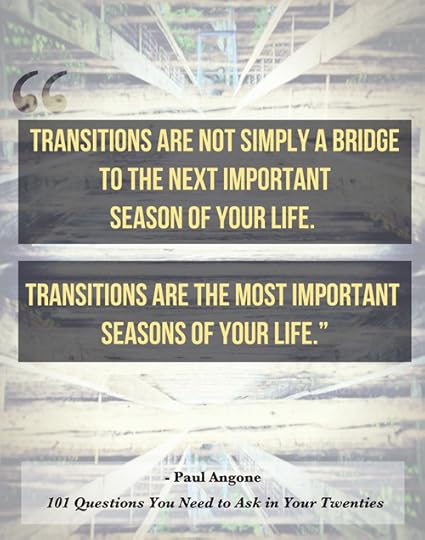
Change is Like a Really Bad Break-Up
Transitions and change can feel like a bad break-up.
One day, you think you’ve found The One and you’re planning out your 2.5 kids and your Labradoodle named Mittens.
Then you get the “we need to talk” phone call. Now, it’s 9:00am in the morning and you’re eating crumbled up Oreos, out of a peanut butter jar, in your pajamas, and watching 23 straight episodes of a 90’s sitcom on Netflix.
Breakups are extremely tough because so much of your identity, plans, and future was wrapped up in that other person.
When that is taken away, you feel lost.
Most life transitions are pretty similar to a bad breakup, aren’t they?
But instead of breaking up with someone else, you’re breaking up with a season of your life and who you were during that time.
And just like the time the relationship you were so sure about met its dramatic end, there’s a real sense of questioning, wondering and wandering.
What We Get Wrong About Transitions
Yet, here’s what I think we get wrong about transitions. We treat them as something to get through as quickly as possible. It’s simply this bridge to cross over as fast as possible. Just get to the other side, no matter what or where. But is that the best way to go through a transition?
The Crazy Truth About Transitions and Change
I’d argue that transitions aren’t just a bridge to the next important season of your life. Transitions are the most important seasons of your life.
There’s something of strange significance that happens to us when we’re stripped of everything we used to depend on.
“Nothing feels comfortable when in transition. Nothing feels normal. In transitions, feeling completely abnormal becomes the new normal.” – 101 Questions You Need to Ask in Your Twenties
As we collectively go through something none of us have ever experienced before, abnormal is definitely the new normal.
Yet, maybe transitions aren’t something to fly through, but something to marinate in.
Especially now as we can’t fly through this coronavirus season. We are being forced to be still. To slow down. To get back to the basics in every facet of our life. To make best of our new realities of this new reality.
What can we learn here? As a big giant reset button is being pressed down on us, what can we change for the better? Maybe there have been some bad habits we’ve been leaning too heavily on that we are being forced to change.
Maybe our old life is being pulled out from under us like a rug and we’re being forced to look at things we’ve been hiding under it for years.
Make This Transition Matter
This is not an easy season of life.
Yet, what can we take away from this intense season of change to positively change our lives and the world in the future?
What questions can we start asking ourselves to be intentional about making this transition matter.
We are given this time.
As you walk through transition, what will guide your way? Is it fear? Or is it faith?
Faith says, This transition is taking me to a much better place. Keep moving forward.
Fear says, I’m screwed!
It’s hard when you’re reading the latest headlines, but I’m trying to live more by faith than fear. More by hope than hopelessness.
Where is this Transition Trying to Lead You?
What is it telling you about the future you want to transition into? Take a moment and think about this.
We all are being reset.
So the question becomes for all of us is — where will we go from here?
What will we create from here? What will we make of this time? What will we show our family, our kids, our community–the best of who we are or the worst?
Don’t just make it through this transition–make the transition matter.
A few years ago I hiked up a mountain and filmed myself talking more about transitions. If you could use a little more encouragement. And a little humor as you see my crazy hair and hear me share my incredible English accent. While also seeing me perform a one-in-a-million trick spit-shot. Check it all out in the video below where I talk more about transitions and change.
March 26, 2020
Hope is alive. Hope is here.
When things feel dark, there is light up ahead.
Hi everyone! This is Paul Angone, the creator of this blog All Groan Up and author of the books 101 Secrets For Your Twenties and 101 Questions You Need to Ask in Your Twenties.
I’ve been deep at work on a new book so haven’t written at All Groan Up in awhile. But I want to send a note of hope and encouragement to all of us as we face a season and time in our world’s history like no other.
Where I live we are being told to stay in place for three weeks. Many of you are facing a similar reality as we all attempt to slow the spread of the coronavirus.
Yet, as we face uncertainties. As we feel alone and nervous about the future. The struggle and challenges are real. Yet, I also believe the hope and the light ahead are real too.
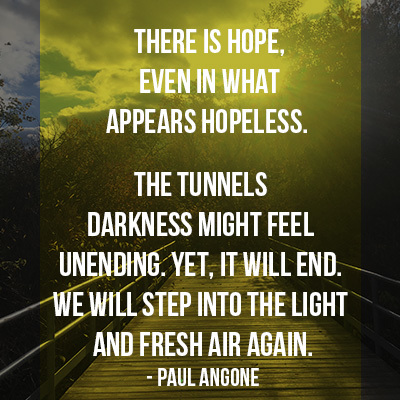
Hope During The Bleakest Hours of WWII
I keep thinking back to World War II and a speech Winston Churchill gave in 1941. The Nazi’s had just defeated France. The United States had not yet entered the war. England looked like it might be destroyed. Terrible bombings shook England at night, leaving a nation locked up in their houses, afraid, alone, uncertain.
Yet, when hope felt lost, Winston Churchill got up in front of the nation and the world, and said these powerful words:
These are not dark days; these are great days—the greatest days our country has ever lived; and we must all thank God that we have been allowed, each of us according to our stations, to play a part in making these days memorable in the history of our race.”
Churchill knew dark days.
Through his lifetime the battle with depression that he called his “black dog,” to his political defeat that sent him in near political exile for the ten years leading up to the war, to only face Hitler and the near destruction of England.
Winston Churchill knew how dark darkness could get. Yet, he made a call for a collective change of perspective. To not see the days ahead as dark, but as a great opportunity for great people to do great things for a great cause.
To be light in the darkness.
Churchill reminded the world of the collective purpose in the struggle, instead of just focusing on the pain.
Churchill was not speaking these words retroactively, looking back at the course of events that led them to victory.
Churchill spoke these words in the face of utter destruction. Yet, he foresaw a radically different outcome than what the current facts at hand were shouting.
He spoke into the face of destruction with hope and purpose. Then, he worked with all his heart to create that reality.
Let the Dark Be Light
There is hope, even in what appears hopeless. The tunnels darkness might feel unending. Yet, it will end. We will step into the light and fresh air again.
Let us take to heart Churchill’s cry to a generation embroiled in the toughest, yet greatest, days imaginable:
Never give in. Never give in. Never, never, never, never—in nothing, great or small, large or petty—never give in, except to convictions of honor and good sense. Never yield to force. Never yield to the apparently overwhelming might of the enemy.”
No matter how dark the darkness feels, there is always hope.
When it’s dark, that just means it’s time for light-bearers to rise up for the world to see. For your home to see. For your kids and family to see.
When it’s dark, that’s an opportunity to bring the light. Now is the time to bring the light.
Much love and hope to everyone!
Paul Angone
PS —
Click here to listen to the inspirational four-minute speech from Winston Churchill.
This article was adapted from my book 101 Questions You Need to Ask in Your Twenties (and let’s be honest, your thirties too).
May 9, 2019
Your dream will be even bigger than you think
What if I told you that your big dreams are going to happen, but WAY bigger than you ever could’ve dreamed?
What if you’re going to inspire people who you’ve never met and don’t even speak their language?
This week I saw this play out first hand when people in Iran started posting pictures on Instagram of 101 Questions You Need to Ask in Your Twenties in Farsi! Check it out!
If I told you five years ago I was going to have a book in Farsi, you would’ve told me to seek counseling.
A few months before that it was seeing pictures of 101 Secrets For Your Twenties in Russian on Instagram!
This is Crazy…
For years I couldn’t get any publisher to publish one of my books in English.
Now they’re reaching people who speak different languages, live in different cultures, yet are resonating with words I wrote.

101 Questions in Farsi! Whaaatt??? This is WAY beyond me.
This extends far beyond my talent. I’m not strategic or smart enough to make any of this happen.
God can do a lot with a little bit of faithfulness.
Fighting Anxiety Attacks
When I was about to release 101 Questions You Need to Ask in Your Twenties and Thirties, I felt like I was cuddling up to anxiety attacks like I was spooning a lion at the zoo come feeding time.
Paul, this is book is going to fail.
Paul, start looking for jobs because this whole writing career is going up in flames.
Paul, this is going to be embarrassing.
Anxiety was sinking its claws into me.
So when 101 Questions officially came out, I drove up to the mountains, sat on a rock and prayed. To try and escape it all.
Then I looked up across the horizon, and I saw a vision of thousands of dandelion seeds spreading out across the sky. And I felt a voice that said “Paul I’m taking your words to far away places you don’t even understand.”
Now I’m getting messages from twentysomethings in Iran who tell me they were in a dark place in life and my book has reached them at a perfect time.
You Never Know..
Friends, this is ABSOLUTELY WILD!
If this goofy guy who felt alone and a failure most his twenties can do it, imagine what you can do!
If your dream feels impossible, you can’t give up now.
Your path will twist and turn to the exact place you need to go.
Keep walking.
Keep the hope.
Keep seeking help when you feel helpless.
The process will all look very different than you imagined, and that’s a good thing! Because the outcome is going to be so much more beautiful than you ever could’ve dreamed.
God doesn’t need a lot of talent. He needs just a little bit of faithfulness.
February 13, 2019
When you feel the urge to run from life…
Today All Groan Up welcomes this insightful guest post from Mackenzie Belcastro. Find out more about Mackenzie at the bottom of this post. Enjoy! ~ Paul Angone
Sometimes life feels so out of whack that all we want to do is run away.
Our relationships are confusing, our jobs borderline degrading, and our sense of self feels like it’s quickly dissolving. Meanwhile, our Instagram feeds are riddled with our friends’ sunny lives, lives we know intellectually are mere highlight reels, and yet make us feel subpar anyway. We wonder if we’re “doing life wrong.”
Would that e-course or growth service really change my life? We ask. Should I be filming myself jumping off furniture like that 10 year old millionaire on YouTube?
Enter: the urge to throw our hands in the air and run—be that to our Netflix queue, the bottom of a wine bottle, or even another country.
Here’s the thing though, our lives don’t need escaping.

What they need, when everything feels wrong and we hopeless, is the opposite.
Instead of trying to outrun our pain points, we’d be best served if we held them close and honored them for what they really are: a call to sit still and reflect.
5 things to ask yourself when this urge to run strikes:
1. What do I dislike about my current situation? And what do I enjoy?
Maybe you like the structure and stability of your job, but you hate the content of it. Or maybe you like what your job entails, but you hate having to respond to someone else. Maybe you like the freedom of being a freelancer but you hate working alone and would benefit from a communal workspace.
Perhaps your pain has nothing to do with your work and everything to do with your personal life. Investigate. You can only design the lifestyle most appropriate for you when you know what’s not working in your life, and what is. From that place of self-awareness, and only from that place, can you move forward.
2. What excites me?
Don’t limit yourself to activities here. Simply think of words that, when curled into your ear, draw a smile across your lips. Don’t explain them. Just make a list of bullet points.
Say you wind up reading “fresh air” and “hiking” or “old movies” and “thrift shopping”—it doesn’t matter what—you will be reminded of what lights you up, and what to make space for in your life.
Note, that doesn’t necessarily mean you need to make a career out of your favorite hobbies, but what it does mean is you need to carve out time to honor what makes you happy. Often, these lists bring up memories buried in our past, creative treasures we’ve pushed aside in the name of “growing up.”
Don’t be ashamed of whatever comes up for you. If you liked reading Nancy Drew when you were eight, look into that. Dig around.
As Robert Greene once said, finding your calling is about looking back to who you were when you were young, noticing what you were drawn to.
3. What does my ideal day look like?
As you ask yourself this, note what you include and what you leave out. For instance, does your ideal day include a lot of people? Very few people? No one? Are you creating something? Helping someone? Or are you at a party? Throwing a party? Is there something going on every hour until bedtime, or is there a lot of downtime? Are you exploring? Reporting? What are you wearing? What’s the weather like?
Here are two ways to go about this exercise. One, take out a blank sheet of paper and begin journalling, in as much detail as possible, starting from the moment you awake—noting the time of day—to the moment you lay your head to sleep. Two, spend ten minutes meditating.
Visualizing yourself moving through your ideal day is extraordinarily powerful. Imagine what your home looks like, where it’s situated, what you’re doing, where else you’re spending your time—everything you’re doing, again, from the moment you rise, to the moment you sleep.
If you want help, there are lots of great videos on YouTube that can help with this.
4. What is one thing I can do to close the gap between my present and my ideal day right now?
This is the most important part. Numbers 1-3 are about becoming self-aware in order for you to get here: the action phase. If you want to change your life, and I mean really change it—so that you no longer want to run away but rather you crave more days to continue doing exactly what you’re doing because it brings you life—you must take action.
“Where do I start?” This is where we often get stuck, caught up in making the “right” first move. But here’s the truth: there is no correct move, ever. There are simply things that jive with us, and those that don’t. And we will never know, truly, what those things are until we start experimenting.
In writing, we say you can’t edit a blank sheet. And so goes the same in life. You have to begin somewhere, anywhere, and then pivot from there, as need be.
If you want to write, write anything—any genre, on any platform, and, again, stay aware of what feels right for you. Same goes for everything, even business. You need to start with a messy rough draft. As Paul writes in his book 101 Secrets For Your Twenties, “Success in your twenties is about having the courage to write a lousy first draft.”
You need to remember that the only real failure is never starting at all. Everything else is a learning opportunity, really.
5. What does it mean, to me, to be “figured out”?
A lot of this anxiety we feel when we compare ourselves to others comes down to this feeling that we are off in the obscure mist, a long way off from where we’re “supposed to be,” meanwhile, our peers are “figured out.”
It seems often like everyone around us is “arriving” in their chosen fields, or settling down in their personal lives, or both. So how can we ease our anxiety when we feel like we’re still zig-zagging in the dark, trying to find our proper path?
One, by doing the above and coming to a clearer understanding of what it even means for us, personally, to be “figured out.” Because, for everyone, that means something different. Some wish for career goals to be met by a certain age, while others rank personal goals ahead on their list.
Ultimately, we can strive to come to a place internally where we don’t put so much pressure on ourselves, where we learn to surrender—let things unfold as they will. But if that’s too “woo” for your Type A personality, then at least understand your own goals, and know that you can only do so much at a time.
Two, we can shift our mindset by reminding ourselves repeatedly that all this topsy-turvy-ness we’re experiencing is, in fact, us on our proper path. This second adolescence we’re swimming through can be a period of exponential growth, if we quit running and start paying attention to how we’re feeling and ask ourselves why.
If and when we do, we will find ourselves gradually more and more aligned with who we are, and if we’re taking action, we’ll find our days increasingly filled with what lights us up.
Remember: change doesn’t happen overnight. It happens through years of listening to our internal signals, starting, pivoting, learning and growing.
P.S. We’re all in this together.
Today’s post was written by Mackenzie Belcastro. Mackenzie is a debut novelist, poet and the co-founder of Saturday Social TO, a biannual event series geared at gathering and educating aspiring creatives and entrepreneurs. She also blogs about her and her arts community’s journeys at mackenziebelcastro.com. Find her at Twitter and Instagram at macbelcastro.
February 5, 2019
9 Surprising Signs Your 20s are Going Better Than You Think
Failing and your twenties go together like Chip and Joanna Gaines. They seem to always be together.
If your 20s haven’t exactly gone as planned, you’re not alone.
Actually, you’re more in the norm than you think.
Nobodies life is as good as it looks on Instagram. As I write about in my new book 101 Questions You Need to Ask in Your Twenties:
There’s another side to everyone’s Instagram photo that they’re not exactly taking a picture of.”
Maybe your twenties are going even better than you think. Even if you feel lost. Even if the challenges you’re facing feel overwhelming.
Check out these surprising signs your twenties are actually going better than you realize.
9 Surprising Signs Your 20s are Going Better Than You Think
1. You’re taking strategic risks
The biggest risk you can take in your twenties is not taking any risks at all!
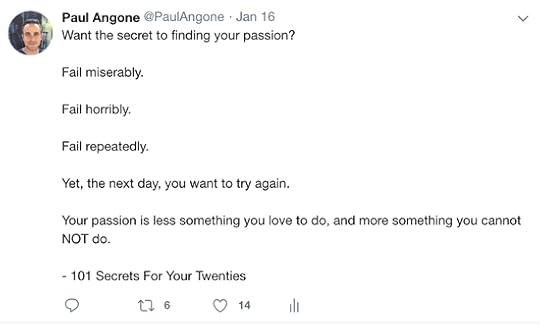
Success in your 20s is having the courage to write a crappy first draft. In a few rewrites, you’ll figure out the story you’re supposed to tell. (click to tweet that)
Keep working on writing your story instead of envying everyone else’s.
2. Nothing feels normal
This doesn’t sound very exciting, but I promise it’s a good thing.
Feeling a little abnormal is the new normal of your twenties.
That just means you’re exploring, trying new things, and finding a new path. If everything felt normal, then you wouldn’t be changing, growing, or creating. You’d be that person still eating five bowls of cereal in your college cafeteria.
While I miss eating bowl after bowl of Berry Captain Crunch, my body is very thankful there is a new normal.
3. You’ve lost some baggage
No, I’m not talking about throwing your luggage off your next American Airlines flight. They frown on that.
I’m talking about cutting off some of the heavy stuff that has been dragging you down. Sometimes that can be a toxic relationship.
Or maybe it’s just negative thoughts you’ve believed about yourself for too long. You don’t grow up without having some negative definitions people have thrown at you stuck on your white canvas.
Whether it’s with a friend or dating relationship, sometimes breaking up is the best thing that could’ve happened. While breakups can feel uncomfortable and painful, it’s actually freeing you to run free and with more purpose.
It’s hard to run a race with a block of cement tied to your ankle.
4. There’s so much you don’t know
When you graduate college, ready to change the world, then quickly realize that you don’t know squat, it can be a sickening feeling.
Yet, the moment you realize how much you don’t know, is the moment a fire is lit to learn more. To dive deeper. To open great books and really ask people questions, not for a grade, but because your life depends on it.
A passionate learner who realizes how much they don’t know is ten times better off than a complacent person who thinks they know everything.

5. You feel challenged at your job
As I first wrote in 101 Secrets For Your Twenties,
The most dangerous job you can have in your twenties is a comfortable one.”
If you feel stretched and challenged at work, maybe that’s a really good thing. Maybe you’re learning and growing way more than if your job came easy.
Sure, it’s not comfortable, but comfort should not be the goal of your twenties.
It’s really hard to do anything worth doing and remain comfortable in the process.
If you’re job does feel easy, maybe it’s time to explore ways to make it more challenging.
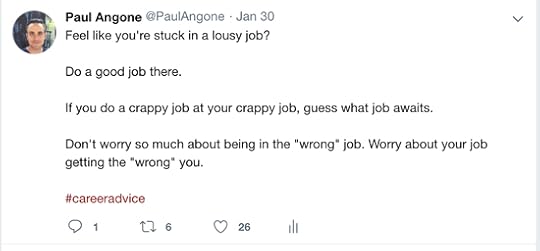
6. You’re asking yourself really good questions
I don’t think there’s anything more important in your 20s than the questions you bring to it. Obviously I think that since my new book has 101 strategic questions for your twenties in it!
If you don’t ask yourself smart, strategic questions about the future you want to live, how are you going to live it?
7. Your outcomes aren’t exactly Instagrammable (yet), but the work you’re doing is getting much better
Your 20s are a process, a step-by-step progression, hopefully building a foundation that will last you a lifetime.
One hit wonders are that because they weren’t able to build a foundation to sustain the weight of success. Notorious B.I.G sang “More money, more problems” for a reason.
Success in your twenties is in the details.
Success is found in the work, not in the sexy outcomes.
If your work is getting better, the right outcomes will come at the right time. I promise.
Success in your 20s and 30s is less about what you harvest, and more about what you plant in the ground! Keep planting, and watering, those seeds. (click to tweet that)

8. You Still Feel a Little Lost
Remember, the first step to exploring is getting lost.
Get lost on purpose with purpose for a purpose.
There’s something of strange significance that happens to us when we lose everything we used to depend on.
If you’re not a little lost, then you’re not exploring and risking.
A life spent on the hot, dusty, trail, following the posteriors of all the people in front of you, is not much of a life at all.
Take a hard right and start figuring out the trail you want to create.
9. You’re not struggling as much to talk about where you’re struggling
We can’t do this journey alone. It’s too hard and too dangerous.
Plus, we connect with each other because of the struggle, not in spite of it.
As I write in 101 Questions You Need to Ask in Your Twenties:
We don’t connect with each other through our pretend perfection. We connect over our shared struggle.
Authenticity starts with you. Be brave enough to go first.
None of us have it all figured out. Those who think they do, are the ones in for the biggest shock of them all.
Yes, the struggle is real. The conversation about it needs to be even realer.
I’d love to hear from you within the comments on this article — which of these signs do you relate to the most?
January 1, 2019
7 best questions to ask yourself this new year
Want to make 2019 your best year yet?
Here’s seven questions to ask yourself to get started.
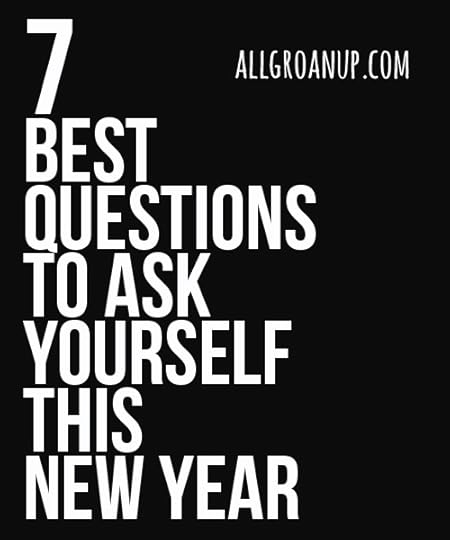
7 best questions to ask yourself this new year
1. How do I find my “77% sure” and move forward?
For years in my twenties, I think much of my angst came because I was subconsciously searching for that perfect path to my future.
Then I realized — the search for perfect is the perfect way to be perfectly miserable.
There is no perfect job. No perfect partner. No perfect friend. No perfect time. No perfect family. No perfect church. No perfect neighborhood. No perfect answer. No perfect path.
Drowning in options is a terrible way to die. Do it big. Do it small. Just do something. – 101 Questions You Need to Ask in Your Twenties (and Thirties)
Find your 77% sure. Make a choice to make a choice. Then move forward. It won’t be perfect. And that’s a good thing.
2. Who inspires me the most?
If you’re struggling to find your passion, purpose, or top values, then ask yourself — who inspires you?
It could be a historical figure, someone you know personally, someone who you follow closely, or even a fictional character. What specifically about them inspires you?
We’re all inspired by different people because part of their story speaks specifically to yours.
3. Do I create or do I complain more?
We can consume more or we can create.
We can criticize more or we can create.
Create more. Complain less. Repeat.
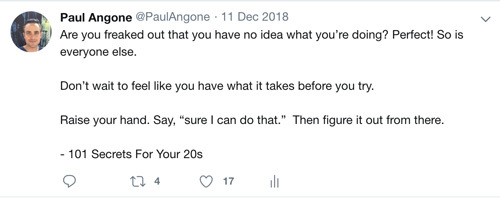
4. What are my problems and personal pain revealing to me about my purpose?
Often times our greatest passions are found in our greatest pain. It’s not sexy, but it’s true.
Knowing what breaks your heart can clarify what makes you feel whole.
Your dream is not dead. Your struggles aren’t a distraction from your calling; sometimes your struggles are the pathway to it.
5. How do I stop “infotainment” from slapping me in the face every five seconds and taking my lunch money?
We are overwhelmed with Way. Too. Much. Information!
Most of it served on a glittering platter of “infotainment” — the illusion of needed info that only exists to get you to click and read more.
This year, practice the art of shutting out the unnecessary noise. It’s all a bunch of distractions trying to keep you from doing your work.
6. Am I putting myself in places to meet new people and start “relationshipping” more?”
You’ll only make as much progress this year as the relationships you’re investing in.
I break down the skill, importance, and best places to do “relationshipping” more in my book 101 Questions You Need to Ask in Your Twenties and Thirties, but basically you don’t have to be a master at networking to make new substantial relationships this year. No, actually quite the opposite.

7. What’s the best that can happen?
Maybe it’s time for a new question.
Instead of the worst that can happen, what’s the best?
If you choose to make a choice, and move forward. If you start creating solutions more and ignore those who only complain about the problems.
If you become inspired by those who have done great things, instead of being engulfed by Obsessive Comparison Disorder on social media.
What’s the best that can happen?
What lives will you impact?
What progress will you make?
What new things will you learn?
How much will you grow this year?
What legacy will you start to build for your family?
What’s the best that can happen? I have an inkling that the best we can even imagine, doesn’t even come close to the amazing that’s in store.
This post is largely taken from my newest book 101 Questions You Need to Ask Yourself in Your Twenties and Thirties. If you’re looking for a guide to jumpstart your new year, I believe this book can help.
If you’ve already read 101 Questions and it was helpful, please consider dropping a quick review on Amazon. Each positive review makes a huge difference.
Thanks everyone! Here’s to more amazing than we can imagine in 2019.
October 31, 2018
The best way to get people to actually care
How do you get people to care about what you care about?
Whether you’re launching a new blog, podcast, book, business, throwing an event, giving a speech, or just updating your social media status, how do you get people to actually care?
This weekend, I had the tall task of speaking to an auditorium full of amazing creatives, entrepreneurs, and speakers at the Tribe Conference. It always feels daunting speaking to a large room full of people more creative and talented than you.
But also at this three day conference, I would speak second to last. As I listened to amazing speaker after speaker, I could definitely feel my own insecurities rising up for a direct attack.
“Paul how are you going to follow all of this?”
Yet, when I gave my talk and walked off stage, I felt like I’d given one of my most powerful messages ever.
Here are the three key things I did that I think took my talk from “good” to possibly transformative.
3 Key Things I Learned About Helping People Care
I started off with my many rejections and failures
I began my talk by reading actual rejection emails I received from publishers turning me down years before my first book 101 Secrets For Your Twenties was published. I took my own advice from 101 Questions You Need to Ask —
“We don’t connect over our pretend perfection. We connect over our shared struggle.”
Really all three of my books are built on that concept. I lead with talking about my own failures to create a safe space and community for readers to smile and say, “thank God I’m not the only one.”
When you lead with your own insecurities, doubts, failures, and fears it allows your audience to take a deep breathe. To sigh and nod and say I’m not alone.
Being honest about your failures doesn’t hurt your credibility, it establishes it. (click to tweet that)
It takes courage to talk about where you lack the most courage. And in that conversation, you breathe life and courage to others.

Here’s a screenshot of one of the more amazing tweets I’ve ever received after a talk. And as a shout-out to Jordin who wrote it, check her out on Twitter at @weirdlivesblog
2. You have to show people you care about them before they will care about you
The most important thing you can do to prompt someone to care about you is to first show that you care about them.
I always care about the audience I’m speaking to. I always want my words to inspire and encourage them.
But for this talk at the Tribe Conference, I really was intentional to tell them how much I cared about them. I told them how brave they were to be creating. I told them how important their work was and how much I loved the audience.
I wasn’t saying this to patronize them. I truly meant that from the bottom of my heart. Because again, I know what the struggle feels like to try and get your work out there through one obstacle and rejection after another.
Yet, I wanted the audience to know, beyond any doubt, that I truly cared about them and their work. When you show someone you care about what they say, then they in turn, care more about what you’re saying.
If they don’t think you authentically care, and are just there to sell them something for your gain, then they won’t trust you. Then they won’t care.
3. I led with what I do best
As I listened to other amazing speakers I could feel my insecurities rising up and telling me to play it safe. I could feel the fear gripping me.
Yet, I made the intentional choice, and had a sense of peace, that I just needed to fully be me. 100 %. That I was going to use my communication strengths of telling emotional, compelling stories and using self-deprecating humor to the max.
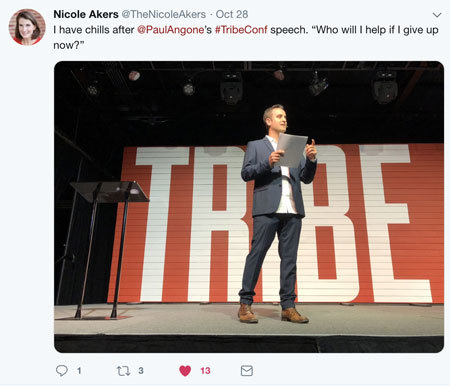
An amazing tweet from Nicole Akers who was that smiling, encouraging face in the front row. Find her on Twitter at @TheNicoleAkers
Don’t try to be better than everyone else. Just be the best you.
Lean into, and lead with, what you do best. That’s authentic. That’s powerful. That’s transformative for you and the audience.
For this talk I made the intentional choice that I was going all in. I was going to use my signature sauce to the best of my ability.
I’ve said it a thousand times, but need to always keep reminding myself that:
“The possibility for greatness and embarrassment both exist in the same space. If you’re not willing to be embarrassed, you’re probably not willing to do anything great.” – 101 Secrets For Your Twenties
The best way to make people actually care
How do you get people to care about what you care about?
Whether you’re launching a new blog, podcast, book, business, throwing an event, giving a speech, or just updating your social media status, how do you get people to actually care?
There’s so much noise today, to cut through and actually have people take notice of what you’re doing, can feel like the impossible dream.
This weekend, I had the tall task of speaking to an auditorium full of amazing creatives, entrepreneurs, and speakers at the Tribe Conference. It always feels daunting speaking to a large room full of people more creative and talented than you.
But also at this three day conference, I would speak second to last. As I listened to amazing speaker after speaker, I could definitely feel my own insecurities rising up for a direct attack.
“Paul how are you going to follow all of this?”
Yet, when I gave my talk and walked off stage, I felt like I’d given one of my most powerful messages ever.
Then the question became — why? Why did I feel like this talk was more effective than others? What happened out there?
Well, here are the three key things I did that I think took my talk from “good” to possibly transformative.
3 Key Things I Learned About Helping People Care
I started off with my many rejections and failures
I began my talk by reading actual rejection emails I received from publishers turning me down years before my first book 101 Secrets For Your Twenties was published. I took my own advice from 101 Questions You Need to Ask —
“We don’t connect over our pretend perfection. We connect over our shared struggle.”
Really all three of my books are built on that concept. I lead with talking about my own failures to create a safe space and community for readers to smile and say, “thank God I’m not the only one.”
When you lead with your own insecurities, doubts, failures, and fears it allows your audience to take a deep breathe. To sigh and nod and say I’m not alone.
Being honest about your failures doesn’t hurt your credibility, it establishes it.
It takes courage to talk about where you lack the most courage. And in that conversation, you breathe life and courage to others.

Here’s a screenshot of one of the more amazing tweets I’ve ever received after a talk. And as a shout-out to Jordin who wrote it, check her out on Twitter at @weirdlivesblog
2. You have to show people you care about them before they will care about you
The most important thing you can do to prompt someone to care about you is to first show that you care about them.
I always care about the audience I’m speaking to. I always want my words to inspire and encourage them.
But for this talk at the Tribe Conference, I really was intentional to tell them how much I cared about them. I told them how brave they were to be creating. I told them how important their work was and how much I loved the audience.
I wasn’t saying this to patronize them. I truly meant that from the bottom of my heart. Because again, I know what the struggle feels like to try and get your work out there through one obstacle and rejection after another.
Yet, I wanted the audience to know, beyond any doubt, that I truly cared about them and their work. When you show someone you care about what they say, then they in turn, care more about what you’re saying.
If they don’t think you authentically care, and are just there to sell them something for your gain, then they won’t trust you. Then they won’t care.
3. I led with what I do best
As I listened to other amazing speakers I could feel my insecurities rising up and telling me to play it safe. I could feel the fear gripping me.
Yet, I made the intentional choice, and had a sense of peace, that I just needed to fully be me. 100 %. That I was going to use my communication strengths of telling emotional, compelling stories and using self-deprecating humor to the max.

An amazing tweet from Nicole Akers who was that smiling, encouraging face in the front row. Find her on Twitter at @TheNicoleAkers
Sometimes in talks I can feel myself begin to play it safe. If I feel like the audience is not really feeling my talk, then I will hold myself back.
Yet, for this talk I made the intentional choice that I was going all in. I was going to use my signature sauce to the best of my ability. I was going to be 100% authentic.
I’ve said it a thousand times, but need to always keep reminding myself that:
“The possibility for greatness and embarrassment both exist in the same space. If you’re not willing to be embarrassed, you’re probably not willing to do anything great.” – 101 Secrets For Your Twenties
October 9, 2018
Let’s hang out this month
“Don’t chase your dreams, grow them. Plant them in the best soil you can find and water them every single day.
And remember: like an avocado seed, it might take about 7 years before you see any fruit.” – 101 Questions You Need to Ask in Your Twenties (and Let’s Be Honest, Your Thirties Too)
A big shout-out to all you dream-planters out there!
I so much appreciate you all. The emails and comments I’ve received from you over the years is what has helped feed my soil as I wondered if my dreams were going to ever make it above ground.
Thank you!
I’ll be traveling across the nation this month to Santa Barbara, Denver, and Nashville, and I wanted to make sure we could connect, if possible.
Here’s the details of the three events I’ll be at, two are open and free for anyone to come and one is a paid conference.
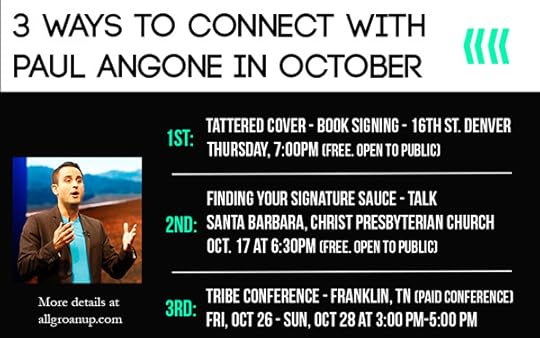
First: Tattered Cover Book Store – Thursday, Oct. 11th – 7:00pm – Denver, CO
This one’s coming in a few days! I’ll be hanging out at the great local bookstore, Tattered Cover at the historic downtown Denver location at 1628 16th Street, Denver, CO 80202. I’ll mainly be just signing books and hanging out with anyone there. Pretty low-key event. And it’s free!
Second: Uncovering Your Signature Sauce – Santa Barbara – Wednesday, October 17 at 6:30 pm
I’ll be doing an Uncovering Your Signature Sauce talk, presented by Providence High School, in Santa Barbara, CA. The event is free and open to anyone who would like to attend. The talk is geared towards parents and their students, but will be applicable to all ages. It will be held at Christ Presbyterian Church, 36 E. Victoria Street, Santa Barbara.
Third: Tribe Conference – Franklin, TN – Fri, Oct 26 – Sun, Oct 28 at 3:00 PM-5:00 PM
I will be one of the speakers at this amazing three day Tribe conference for writers, artists, and creative entrepreneurs.
Click here to find more details about the speaker line-up at the Tribe Conference.
The conference is sold-out for the public, but they are allowing a few more spots for personal invites from the speakers themselves. So consider this your personal invite from me!
This event will be full of information and inspiration. It is a paid conference, but if it helps you get unstuck and start moving forward more strategically towards your dream, it’s going to be worth every penny.
Thanks everyone! I hope to connect with you in person this October.
Have any questions for me? Always feel free to email me direct at paul@allgroanup.com
Keep warring for hope. Keep talking about and believing the truth of your future, even if the present feels lackluster. – 101 Secrets For Your Twenties
October 2, 2018
Are there dark days ahead?
This question came out of a not-so-ordinary college graduation speech by a not-so-ordinary speaker.
First, the graduation speech was only four minutes long! A miracle in itself.
Second, and most importantly, the speaker that day wasn’t just addressing the graduating class at Harrow School, but a whole country. And doing it with more power and truth in four minutes than most speakers deliver in a lifetime.
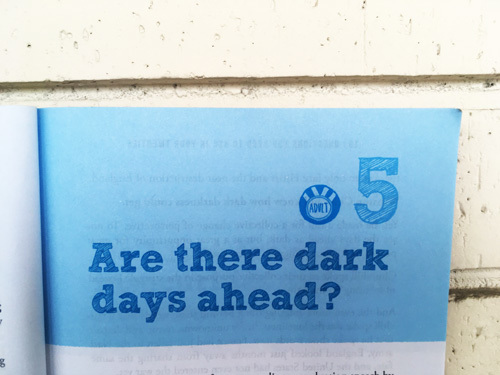
The graduation speaker? Winston Churchill.
The year? 1941, as England stared down their complete annihilation in the hands of the Nazi army.
Yet, in the face of this harsh reality, Churchill spoke these words:
Do not let us speak of darker days: let us speak rather of sterner days. These are not dark days; these are great days—the greatest days our country has ever lived; and we must all thank God that we have been allowed, each of us according to our stations, to play a part in making these days memorable in the history of our race.”
Churchill knew dark days. Through his lifetime the battle with depression that he called his “black dog,” to his political defeat that sent him in near political exile for the ten years leading up to the war, to only face Hitler and the near destruction of England.
Winston Churchill knew how dark darkness could get.
Yet, he made a call for a collective change of perspective.
To not see the days ahead as dark, but as a great opportunity for great people to do great things for a great cause.
Churchill spoke to their collective purpose in the struggle instead of focusing just on the pain.
And the even more amazing thing beyond these words that Churchill spoke was the loneliness, heavy unknowns, terror, and despair that he spoke these words into.
France had just fallen to the Nazi army, England looked just months away from sharing the same fate, and the United States had not even entered the war yet.
Churchill was not speaking these words retroactively, looking back at the course of events that led them to victory.
Churchill spoke these words in the face of utter destruction, yet he foresaw a radically different outcome than what the current facts at hand were shouting.
He spoke into the face of destruction with hope and purpose. Then, he worked with all his heart to create that reality.
Let the Dark Be Light
When we think about the tough times of our twenties and thirties, and there will be many.
And the tough times we will go through in the years after our twenties and thirties, and there will be many.
When we feel like the world is getting darker around us by the minute.
Let us take to heart Churchill’s cry to a generation embroiled in the toughest, yet greatest, days imaginable:
Never give in. Never give in. Never, never, never, never—in nothing, great or small, large or petty—never give in, except to convictions of honor and good sense. Never yield to force. Never yield to the apparently overwhelming might of the enemy.”
No matter how dark the darkness feels, there is always hope.
When it’s dark, that just means it’s time for light-bearers to rise up for the world to see.
When it’s dark, that’s an opportunity to bring the light. Will you grab a torch and shine? (click here to tweet that)
This article came from my book 101 Questions You Need to Ask in Your Twenties (and let’s be honest, your thirties too). See what readers are saying about 101 Questions here.
Click here to listen to the four-minute speech from Winston Churchill at the Harrow School.

